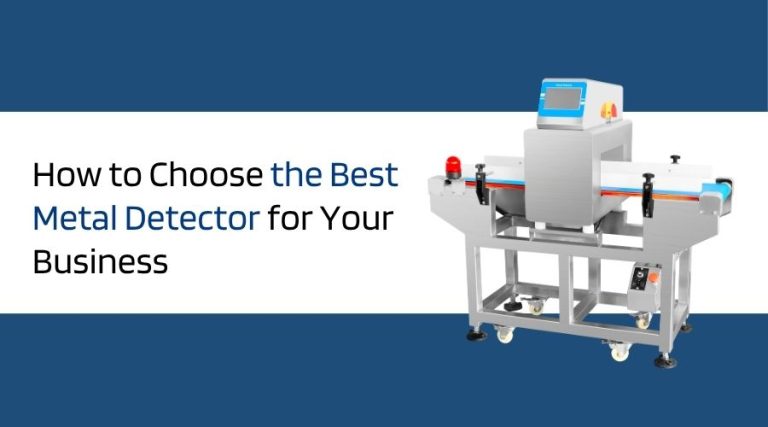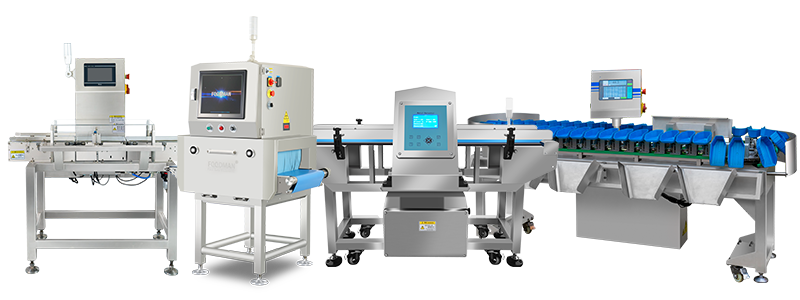Introducion
A metal detector is very important for processing line of your business. Whether you are in the food processing, cosmetics or packaging industry, choosing the best metal detectors can protect your products from hazards and help you meet various types of regulatory requirements. But with so many kinds of metal detector machine to choose from, how do you make the right choice?
This article will help guide you toward making an informed decision on the Best Metal Detector! We’re going to discuss how metal detectors work and what they can detect and help you select the best metal detector equipment for your operation, product and process flow and overall requirements.
Let’s break down the essentials.
What Do Metal Detectors Detect?
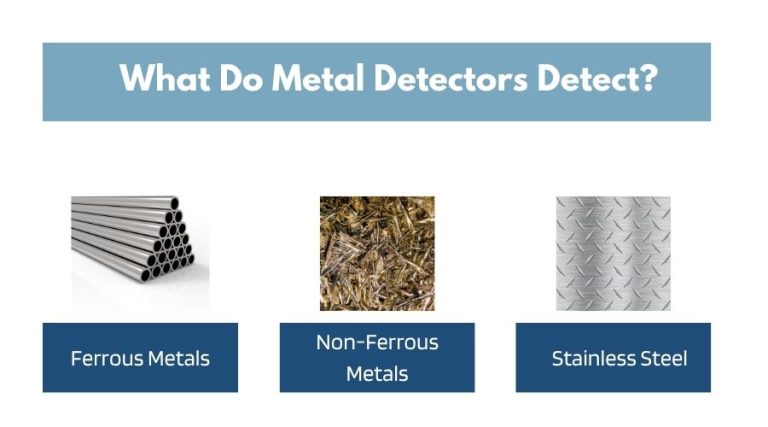
Metal Detectors To Detech Various Types Of Metals According to the detector, the latter can be able to detect:
Ferrous Metals
Iron or steel and other ferrous metals are the most noticable for the metal detectors. These metals are magnetic, so they generate a stronger signal in the detector’s field. Ferrous particles in food or machinery, which could cause defects, can be easily detected by metal detectors.
Non-Ferrous Metals
Non-ferrous metals -aluminium, copper, brass, are more difficult to detect. Detectors that are selective for non-ferrous metals use special techniques e.g. multifrequency, to detect them. Because aluminum finds its way into many industries, for instance, it’s important to employ a detector that can detect the tiniest bits of aluminum.
Does Aluminum Set Off Metal Detectors?
Yes, metal detectors can detect aluminum, but it depends on the type of metal detector you choose.
Can Aluminum Foil Packaged Products Be Detected by a Metal Detector?
This is a common question in industries dealing with aluminum products. The answer is yes, aluminum can be detected by metal detectors. However, detecting aluminum foil packaged products requires a specialized type of detector. Standard metal detectors that detect ferrous metals may not pick up aluminum. For that, you will need a Metal Detector for Aluminum Foil Packaged Products are specifically designed to detect aluminum, even when it’s thinly layered or embedded in packaging materials. These machines use different electromagnetic techniques to identify aluminum, copper, brass, and other non-magnetic metals.
Stainless Steel
Stainless steel is common in food processing and manufacturing, and it’s often used in equipment and packaging. Metal detectors for food industries are particularly tuned to identify fragments of stainless steel, ensuring that small fragments don’t contaminate food products.
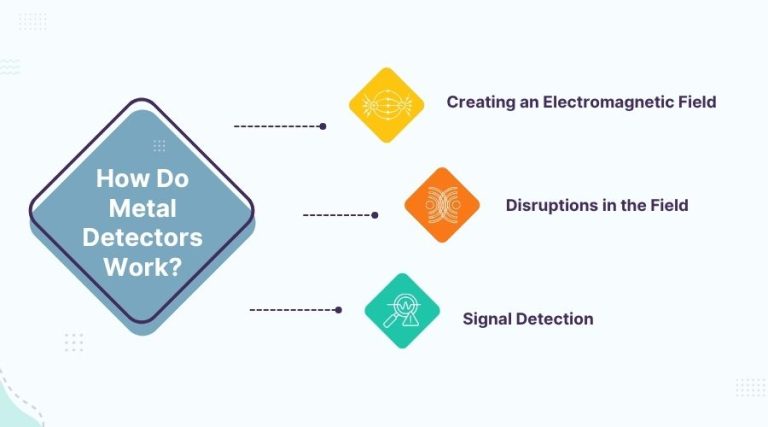
Prior to selecting a metal detector machine, it is crucial to learn how these machines work. The working principles of metal detectors are hinged on electromagnetic fields. Below is a short elaboration:
Creating an Electromagnetic Field: Each of the products has a magnetic field created by the conveyor as the products pass through the scanner’s detection zone.
Disruptions in the Field: The detection field’s magnetic field is disrupted by the presence of certain metal objects.
Signal Detection: The disruption reports to the detector and the appropriate action is taken to alert the operator.
How Does A Metal Detector Function Throughout Food Processing?
In the manufacturing sector, food industry metal detectors have a specific role of protecting the products against metal contamination. Specific metal detectors for food used in the industry are designed with precision grade sensors capable of picking even minute metal particles in the food to avoid contamination and adhere to global standards.
Where to Use a Metal Detector?
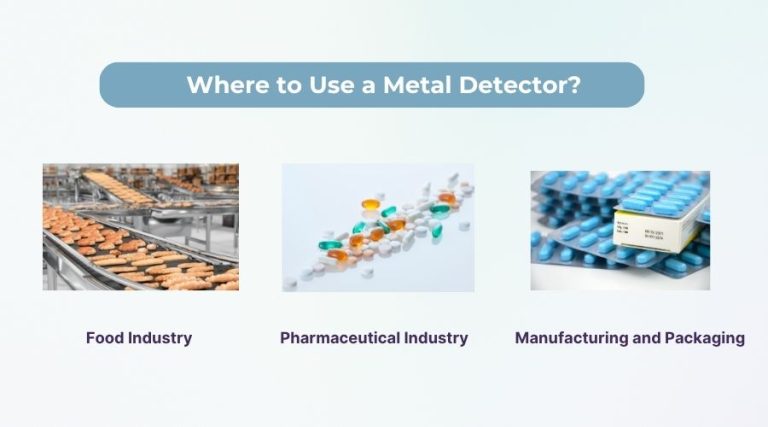
In the sectors where you have potential of metal contaminants, a metal detector machine is a must have. Common users of metal detectors are found in:
Food Industry
In the food industry, the need for accurate and reliable food metal detectors is critical. These detectors are used to identify metal fragments that may have inadvertently found their way into food products during production. For example, small pieces of stainless steel or iron from machinery can cause serious contamination. Food metal detectors help prevent this by ensuring that food products are thoroughly scanned before reaching the consumer.
Pharmaceutical Industry
In pharmaceutical manufacturing, even the smallest piece of metal can compromise the integrity of a product. Pharmaceutical companies use metal detectors to ensure that tablets, syrups, and capsules are free of contaminants. This is essential for maintaining quality and adhering to strict safety regulations.
Manufacturing and Packaging
Metal detectors are also widely used in manufacturing and packaging plants to prevent metal contamination in raw materials or finished products. For instance, aluminum fragments from packaging can damage sensitive machinery or end up in the final product. Using conveyor metal detectors ensures that these issues are caught before products are shipped out.
How to Choose the Best Metal Detector for Your Business
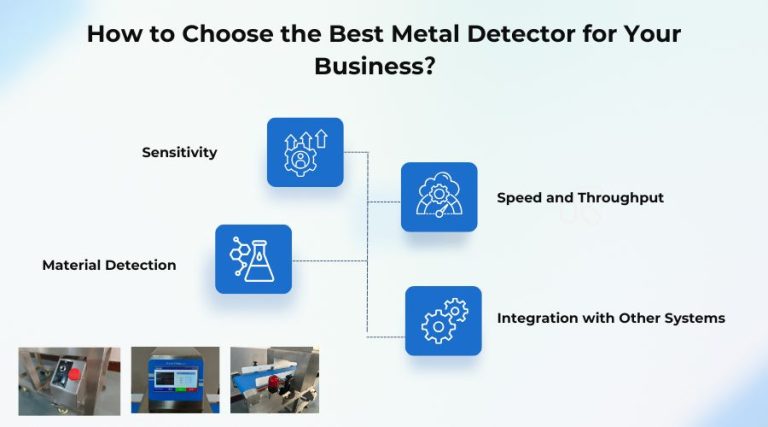
Now that we’ve covered how metal detectors work and where they’re used, let’s dive into how to choose the best one for your business. Here are the key factors to consider:
Sensitivity
Sensitivity is one of the most important features to consider when choosing a metal detector machine. Higher sensitivity ensures that smaller fragments, even those made of aluminum or stainless steel, are detected. A high-sensitivity detector is essential in industries like food processing, where even the smallest metal pieces can be harmful.
How to Determine Sensitivity?
When evaluating sensitivity, check the detector’s specifications. Some metal detectors allow users to adjust the sensitivity level based on the type of product being processed, while others offer automatic calibration for optimized sensitivity.
Material Detection
What metals will the detector need to find? This is a crucial factor when selecting a metal detector. For industries that use a lot of aluminum, you’ll need a Metal Detector For Aluminum Foil Packaged Products. On the other hand, if your products is packaged by aluminum (like sachet coffee, chips, etc), Metal Detector For Aluminum Foil Packaged Products is suitable for your production line.
Speed and Throughput
If your business operates on high-speed production lines, you’ll need a conveyor metal detector designed for fast scanning. High-speed metal detectors allow you to inspect large volumes of products in a short amount of time without slowing down production accuracy.
Integration with Other Systems
Another important consideration is how well the metal detector integrates with your existing systems. Whether it’s a conveyor metal detector or a food metal detector, integration with conveyors, reject systems, and data analysis tools ensures smooth operation.ullamcorper mattis, pulvinar dapibus leo.
Why Choose a Metal Detector for Your Business?
So, why should you invest in a metal detector for your business? Here are just a few of the key benefits:
Quality Control
Food metal detectors help maintain the quality of your products and identify and eliminate products with metal contaminants. This is especially important in industries like food processing, where contamination could lead to serious health risks or expensive recalls.
Compliance with Safety Standards
Regulatory bodies like the FDA and EU require businesses to maintain high safety standards. Using metal detectors ensures that your products meet these stringent regulations.
Cost-Effective
While metal detectors require an initial investment, they help save money in the long run by reducing the risk of recalls, customer complaints, and production delays. Additionally, they help businesses avoid expensive machinery repairs caused by metal contamination.
Conclusion
Choosing the best metal detector for your business is crucial for ensuring product quality, safety, and regulatory compliance. Whether you’re in the food industry, pharmaceuticals, or manufacturing, metal detectors help you identify contaminants like aluminum, stainless steel, and iron before they reach consumers.
By considering factors like sensitivity, material detection, and integration with your existing systems, you can find the ideal metal detector machine for your needs. Invest in the right technology to protect your brand and provide your customers with safe, high-quality products.
FAQs
How does a metal detector work on a food production line?
When a product passes through the machine, metal impurities in the product interfere with the electromagnetic signal it emits. The metal detector then responds – usually with an alarm or reject mechanism.
Can metal detectors detect aluminum packaged products?
Yes, but not all models can. Choose our Metal Detector For Aluminum Foil Packaged Products for better sensitivity.
What do metal detectors detect best?
Ferrous metals are easiest to detect. Non ferrous metals and stainless steel are harder but detectable with the right setup.

